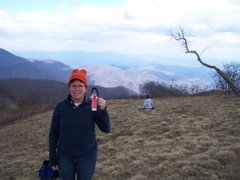Over the last decade, 430 teachers have impacted thousands of students in over 200 schools through ATC's education workshops
ATC Education Objectives:
- Host four regional workshops in Place Based Service Learning along the Appalachian Trail annually. Workshops allow for diversification of teaching practices, and increase school/community connections through economic, social, and environmental aspects.
- Provide instruction, resources, partners, and a network for participants and alumni through a community of practice.
Our education workshops promote
rigorous curriculum development based on state and common core standards. To
this end, teachers in the program are exposed to tools such as the
Understanding by Design framework (Grant P. Wiggins, Association for
Supervision & Curriculum Development), principles of place-based service-
learning, Project Learning Tree, Leave No Trace, Questing, and Children &
Nature Network resources on family hiking, and place-based education.
Impacts
on Teachers and Partners:
The sheer
volume of partnerships created with schools, school districts, youth serving
organizations, new volunteer groups, new teachers, alumni of the program,
agency staff at local, state, and federal levels, and community partner
organizations does not convey the true impact served through stories, trust
that’s been built, and teachers ignited and renewed in spirit. We provide support for renewal as growth of
practitioners and as connectors to a network of communities in practice.
Educators and partners alike leave workshops inspired to pass on learning
to students and communities.
Impacts on Academic Achievement:
Students
realize the connection between direct classroom instruction and real world
global application of concepts. Increased student engagement, positively
influence student’s attitude toward school, increased self-efficacy, and allows
for the potential of greater academic success for students as a result of
student centered learning.
Impacts
on Community Partnerships:
As an
example of a community need met, the A.T. Community of Front Royal went through
years of requesting help for a safer hiker crossing in town. After
participating in TTEC, a teacher led students to write letters to local and
state officials, and safer crossing was seen.
Read more
We see
community learning and actions like these as ways schools, students, teachers,
and partners are fostering community wellness, providing social learning
through diverse learning theories, and building communities of practice with
teachers and communities alike.
Students
and teachers are supporting management of the Appalachian Trail by building
interpretive kiosks, managing invasive exotic plants, creating GIS maps for
greater understanding of Trailhead access for community visitors, supporting
stewardship activities like trail maintenance, phenology monitoring, and
natural resource management, creating community A.T. themed murals, cleaning up
graffiti, learning how to advocate for public lands, and much more!
88
schools have
at least one teacher that confirmed they still actively use their TTEC
curriculum.
The four regional workshop locations are chosen through criteria such as:
The four regional workshop locations are chosen through criteria such as:
- Does the school/district broaden our reach to diverse communities?
- Has the school/district expressed interest?
- What partnerships does this area leverage?
- Which designated A.T. Communities does it support?
- Does it serve communities near the Trail?
- Is it working towards building a team of trained teachers from one school district?
1) A Forest For Every Classroom workshop for metro-Atlanta teachers in northern Georgia. Partners included: Georgia Appalachian Trail Club, Greening Youth Foundation, US Forest Service, Len Foote Hike Inn education staff, and recreational outfitter REI. Read More
2) In Massachusetts, teachers from throughout Berkshire County were invited. Partners included: A.T. Community representatives from Great Barrington, Dalton, and North Adams, Appalachian Mountain Club- Berkshire Chapter, Greenagers, Flying Cloud Institute, Massachusetts Department of Conservation and Recreation, Great Barrington Land Trust, NPS RTCA.
3) In Virginia, ATC partnered with the Rockbridge County Public Schools Foundation to host an August TTEC workshop designed to arm teachers with tools and inspiration to make the most of a grant opportunity created by the designated A.T. Communities of Glasgow and Buena Vista. The two-day workshop was based at Natural Bridge State Park, and included hands-on outdoor learning with a STEAM focus each morning and curriculum development in the afternoons. U.S. Forest Service and State Park personnel and volunteers from the Natural Bridge Appalachian Trail Club supported the workshop as well as the teachers’ ongoing curriculum projects.
4) ATC’s Mid-Atlantic region is home to the greatest density of TTEC alumni, so an alumni workshop was held for eight active alum from five different school districts at the Kirkridge Retreat. A Potomac Appalachian Trail Club volunteer who is also a retired teacher and National Park Ranger assisted with instruction. The highpoint was listening to the alum tell their stories about what TTEC has meant for their professional development and their students.
For more information on ATC's education workshops, contact jjudkins@appalachiantrail.org


No comments:
Post a Comment